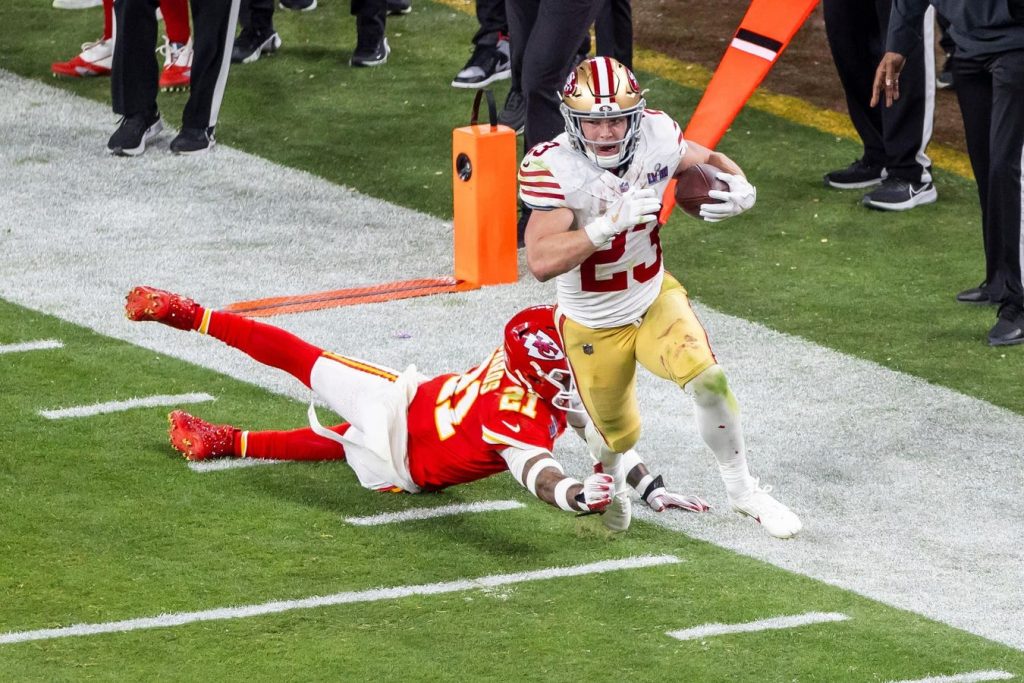Losing a star player would be any team’s Achilles Heel, so to speak. Now, it looks like the newly revealed diagnosis of Achilles tendinitis is going to keep the San Francisco 49ers star running back Christian McCaffrey out longer than what was initially expected during pre-season. What was labeled in early August as a calf strain had kept the reigning NFL Offensive Player of the Year out all of the 49ers pre-season games. But after McCaffrey was surprisingly held from the 49ers week 1 regular season matchup against the New York Jets, head coach Kyle Shanahan revealed on Tuesday that McCaffrey also had Achilles tendinitis.
That’s landed McCaffrey on injured reserve, causing him to miss the 49ers’ Week 2 clash with the Minnesota Vikings. This means that he will have to sit out at least 4 weeks. But it could be longer as the NFL Network’s Ian Rapoport reported:
Yeah, having Achilles tendinitis is not fun. In fact, no tendinitis is fun. Since the suffix “-itis” means inflammation of whatever the “-itis” is attached to, tendinitis is inflammation of a tendon. A tendon is a tissue that connects muscle to bone.
And make no bones about it, your Achilles tendon is pretty darn important. If someone were to show you on Jeopardy the phrase “The largest tendon in your body,” your answer should be “What is the Achilles tendon?” Your Achilles tendon specifically connects your calf muscle to your heel bone. You should have no more than two Achilles tendons, one in each leg, assuming that you are not a caterpillar.
You use your Achilles tendon basically every time you extend your foot in any way including lifting your heel to walk, run, jump or step upwards. This occurs when your calf muscles contract and pull on the tendon and thus your heel.
Overuse or too much stress on this tendon can lead to Achilles tendinitis. That includes too much running and jumping, two things that football players do a lot. Such tendinitis can arise when your calf muscles are too tight, pulling too hard on the tendon.
The most common symptoms of Achilles tendinitis include aching, tenderness or stiffness in the back of your lower leg, around where the Achilles tendon is located. You can see then why this can be a bit difficult to distinguish from calf tightness or a calf strain.
Doctors may be able to diagnose Achilles tendinitis through a physical exam. They’ll push on your Achilles tendon to see if there is tenderness there. They can also have you extend your foots and see if that elicits pain. Imaging such as ultrasound or magnetic resonance imaging can help with figuring out what’s going on there.
The cornerstone of treatment is RICE. No, not the stuff that you eat with sushi, but Rest, Ice, Compression, and Elevation. Anti-inflammatory medications such as ibuprofen can help decrease the inflammation. You can also get physical therapy, which consist of stretching and strengthening exercises for the Achilles tendon and its supporting structures. Orthotic devices that elevates your heel can help relieve the strain on your tendon as well.
When you have Achilles tendinitis, you don’t want to keep stressing your Achilles tendon for two reasons. One it hurts. The other is that continued use may further damage the tendon, leading to a tear or rupture of it. That can make surgery necessary. After all, if you can’t extend your foot, you can’t really walk.
McCaffrey’s replacement at running back has been Georgia tech-grad Jordan Mason, who’s done a pretty good job so far. The second string RB gained 147 yards and scored one touchdown against the Jets and added 100 yards and another touchdown in Sunday’s loss to the Vikings. Mason will have to keep building on more such rushing performances because McCaffrey will be out at least till San Francisco’s October 10 showdown against the Seattle Seahawks. In other words, Mason will have to do what he can to make sure that the running game does not end up being the 49ers’ Achilles Heel.
Read the full article here






